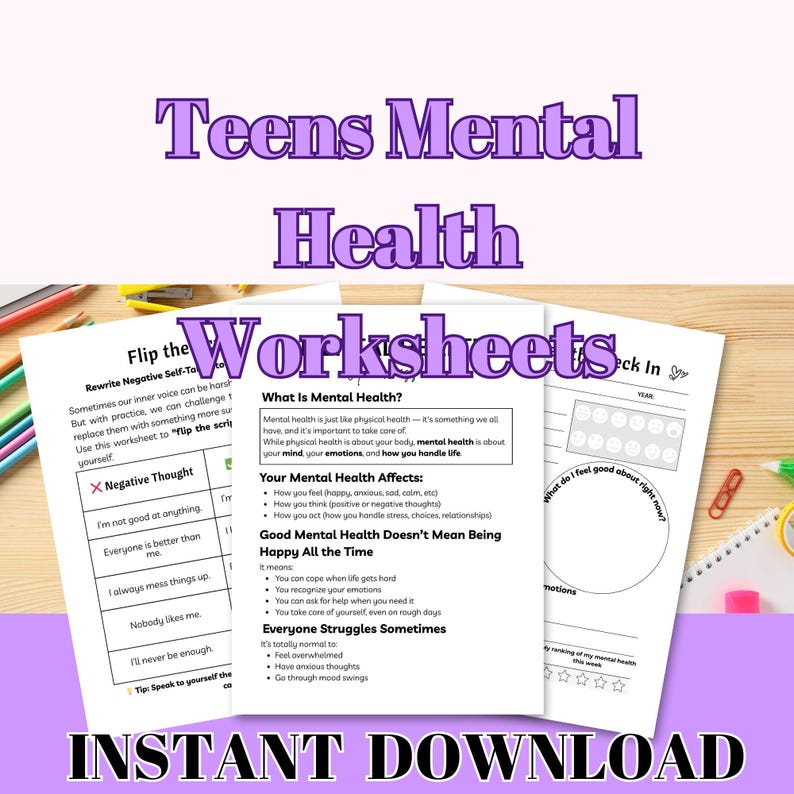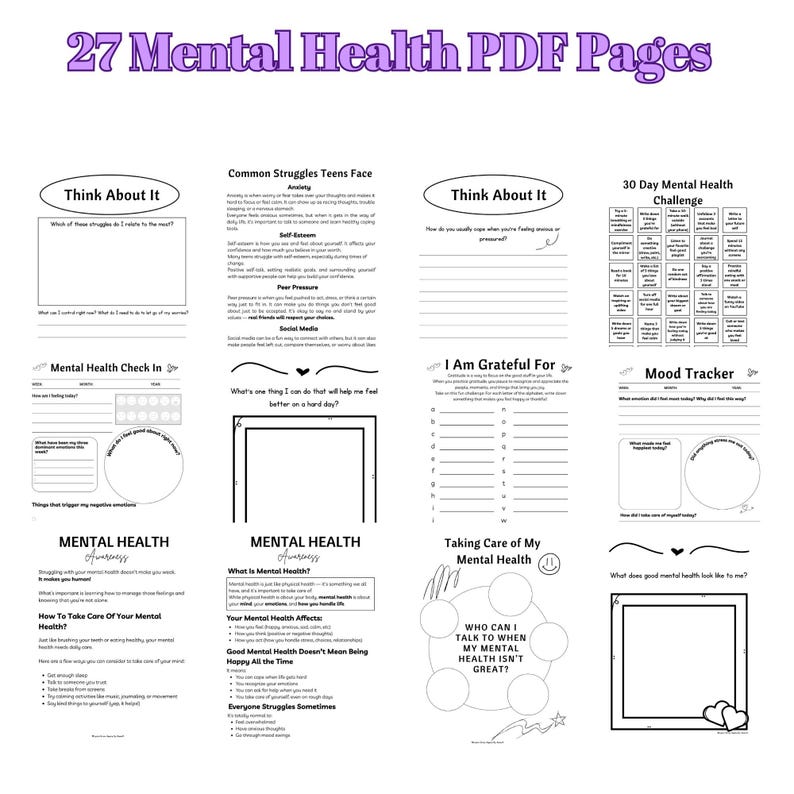Discover seven powerful ways to support teens’ mental health.

Teenage years are a time of tremendous growth, transformation, and self-discovery. But amid the excitement of becoming more independent and shaping their identity, many teens also struggle with emotional challenges that can have lasting impacts on their mental well-being.
According to the CDC, more than 1 in 3 high school students report experiencing persistent feelings of sadness or hopelessness.
It’s no surprise that mental health concerns among teens are more prevalent than ever, with rising academic pressures, social media influences, keeping up with trends, comparisons, and uncertainties about the future.
As parents, counselors, or caregivers, we all play a vital role in supporting our teens’ mental health. Even when they seem distant or reluctant to talk, our encouragement, understanding, and proactive steps can make a whole lot a difference.
In today’s blog post, we’ll explore how mental health affects teens, and I will share seven practical and effective ways I’m using to help my teen daughter thrive emotionally, mentally, and socially. So that you can do the same.
How Mental Health Affects Teens?
Mental health includes emotional, psychological, and social well-being.
For teens, this aspect of health is crucial because it affects how they think, feel, handle stress, relate to others, and make decisions.
When mental health is compromised, it can impact every area of our teens’ lives, including:
Academic performance – Eventually, they will struggle with anxiety, depression, or attention issues, which can lead to poor concentration, missed assignments, or declining grades.
Relationships – Teens may withdraw from friends and family or lash out in frustration.
Physical health – Mental health struggles often manifest physically through sleep disturbances, headaches, changes in appetite, or fatigue.
Self-esteem – Teens with mental health challenges may feel unworthy, less than, and/ or hopeless about the future.
Risky behaviors – Unaddressed emotional pain can sometimes lead to self-harm, substance use, or other risky behaviors.
It’s important to note that mental health is not just about avoiding illness – it’s about helping teens build emotional resilience, cope with life’s challenges, and develop a strong sense of self-worth.
7 Powerful Ways To Support Teens’ Mental Health
1. Foster Open and Nonjudgmental Communication
Teens are more likely to open up if they feel understood, respected, and appreciated.
So, create a safe space where they can share their thoughts and feelings without fear of punishment, judgment, or ridicule.
Engage in conversations with your teen. Oftentimes, I would ask open-ended questions to my daughter, such as – “What’s been on your mind lately?” “What are you currently watching on YouTube?”
I try to be present and listen without immediately offering solutions or corrections. Something I’m currently working on.
Even if you don’t agree, validate their feelings with phrases like, “That sounds really tough,” or “I can understand why you’d feel that way.”
Sometimes, just being a good listener is the most powerful thing you can do as a parent or caregiver.
2. Teach and Model Healthy Coping Skills
Teens are still learning how to manage stress, conflict, and emotions.
Equip them with tools like:
-
Deep breathing and grounding techniques
-
Physical activity or outdoor time
-
Talking to a trusted adult or therapist
-
Setting boundaries and managing time effectively
You can also model these behaviors yourself. Show them how you handle disappointment, manage stress, or ask for help; your example speaks volumes.
3. Encourage Healthy Routines
Mental wellness is supported by strong routines.
Help your teen establish a consistent schedule that prioritizes:
Sleep – Aim for 8 – 10 hours of sleep per night. Lack of sleep can intensify feelings of anxiety or depression.
Nutrition – A balanced diet can boost mood and energy levels.
Physical activity – Movement reduces stress and releases feel-good endorphins.
Downtime – Teens need time to rest, recharge, and just be kids.
Avoid overscheduling them. It’s okay and healthy for teens to have unscheduled time in their day.
4. Limit and Monitor Social Media Use
This can be a tough one. But the truth is, social media can be both connecting and isolating. It can boost confidence or fuel insecurity. Reminding your teen of this by having a conversation on how the people they are following or looking up to on social media make them feel.
Excessive screen time and exposure to unrealistic images or online drama can affect a teen’s self-esteem and mental health.
- Set clear boundaries around screen use (e.g., no phones at bedtime).
- Encourage regular screen-free time each day.
- Talk openly about what they see online and how it makes them feel.
- Promote a balance between digital and real-life experiences.
5. Create a Supportive Home Environment
Your home should be a place of safety and encouragement for your child.
Small, intentional actions can help build a positive emotional climate:
-
Offer praise for effort, not just results.
-
Encourage their interests and passions, even if they’re different from yours.
-
Respect their need for privacy while staying involved.
-
Keep family rituals like dinner together, movie nights, or weekend walks.
A loving, consistent, and responsive environment will give your teen the confidence to face challenges head-on.
6. Watch for Warning Signs
Sometimes teens don’t speak up when they’re struggling, so it’s essential to watch for changes in behavior, mood, or functioning, such as:
-
Withdrawing from friends or activities
-
Sudden drop in grades
-
Sleep disturbances
-
Increased irritability or sadness
-
Talking about feeling hopeless or worthless
-
Risk-taking or self-harming behavior
Trust your parental/caregiving instincts.
If something feels off, reach out – either to your teen directly or to a mental health professional for guidance.
7. Normalize and Seek Mental Health Support
One of the best things you can do is break the stigma around mental health. Remind your teen that it’s okay to ask for help.
Some suggested things you can say can go along the lines:
-
“It’s normal to feel overwhelmed sometimes.”
-
“Everyone has mental health, just like physical health.”
-
“Talking to a counselor isn’t a sign of weakness, but rather it’s a strength.”
Consider connecting with school counselors, therapists, or local support groups if needed. Early intervention can prevent problems from becoming more serious later on.
You’re Not Alone, And Neither Is Your Teen
Navigating adolescence isn’t easy for teens or their parents.
But with patience, empathy, and the right support systems, your teen can build emotional strength that will serve them well into adulthood.
I remind myself every day that it’s okay not to have all the answers.
What matters most is showing up with love, understanding, and a willingness to walk alongside our teen/s through life’s ups and downs.
Support Your Teen With Helpful Tools

If you’re looking for ready-to-use tools to support your teen’s mental wellness, I’ve created a set of printable Mental Health Worksheets available on Etsy. I’ve designed these worksheets to help my teen and many other teens to:
- Build mental health awareness
-
Identifying triggers and building resilience
- Foster positive self-talk
-
Learn healthy coping strategies
-
Practice gratitude
-
Practice self-love and self-compassion
-
Set personal goals

These mental health awareness worksheets and activities are perfect for parents, teachers, school counselors, or youth group leaders who want to encourage meaningful conversations and build mental health awareness.
My friend, by committing to taking small, intentional steps daily, you can make a big difference in your teen’s life. I assure you, their future self will thank you for it.
Pin These Mental Health Worksheets For Teens
Head to your Pinterest account and save these teens’ mental health awareness worksheets and activities so you can easily come back to them.
And please consider following us while on Pinterest.

Some of the links in this post may be affiliate links. I’m also an Amazon Affiliate and will occasionally link to some of my favorite Amazon products. I will receive a small percentage back if you purchase through my link. You won’t be charged a penny more if you shop through my links. That said, I do NOT recommend anything I do not use and love! Thank you for helping support my blog!

